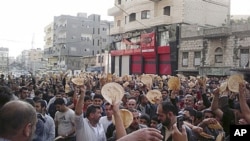A lynchpin is defined as a "pin inserted through an axle tree to hold a wheel on." If the lynchpin falls out, the wheel comes off. Syria could be just such a lynchpin in the Middle East.
|
Listen to David Byrd's report and his Q & A with Cecily Hilleary:
|
The current unrest in Syria puts several actors - the United States, Syria, Israel, Iran, Saudi Arabia and Lebanon - at the table for a high-stakes game.
The United States
The U.S. State Department last week announced a round of sanctions against Syria, including against Mahir Al Assad, President Bashar al-Assad’s brother and the head of the Syrian Army’s 4th Armored division.
Secretary of State Clinton said Friday that the sanctions are intended to stop the Syrian government’s crackdown.
“The sanctions that were announced today are intended to show the Syrian government that its behavior and actions are going to be held to account and they must begin taking steps to respond to the legitimate aspirations of their people and respect the rights of their people,” Clinton said.
Brian Katulis is a senior fellow at the liberal think-tank, the Center for American Progress. He told the Reuters news agency that while the new sanctions might send a message, they will have little effect.
“They freeze assets of these individuals that are under U.S. jurisdiction,” he said. “They don’t have many assets in U.S. jurisdiction, so I think these are aimed at trying to send a message, but don’t really have as much teeth as many people would like,” Katulis added.
But sanctions haven’t stopped the crackdown. Syria has continued to crush dissent in Daraa, where the opposition movement started, as well as in other towns, including Homs and Latakia. One move the U.S. has not suggested is military intervention, either unilaterally or as part of a coalition. And the White House has not called for President Assad to step down.
Iran
The U.S. sanctions also target the Iranian Islamic Revolutionary Guard Corps – Qods Force. Washington has designated the al-Qods force as providing material support to terrorism since 2007.
Iran and Syria have long been allies. Syria is regarded as a major conduit for Iranian weapons headed to Lebanon and Gaza for Hezbollah and Hamas. Damascus and Tehran were also allies against Saddam Hussein’s Iraq in the 1980s.
Iran would also lose regional influence if a Sunni-based government replaced the Alawite Assad regime.
Joshua Landis, the head of the University of Oklahoma’s Center for Middle East Studies and the author of Syria Comment blog, says Iran has to play this game carefully.
“Iran can’t send troops, and neither can Hezbollah,” Landis said.
“Many people have asked, ‘Well, why won’t they go in and defend them the way Saudi Arabia sent troops to Bahrain to put down the Shi’ites?’ But Syria’s government is Arab nationalist. Should Iranians or people from Hezbollah come to side with the regime, it would look extremely sectarian. It would look like a foreign invasion. And it would completely undermine the credibility of the government or what credibility is left,” Landis added.
Israel
The Golan Heights have been a sticking point in peace negotiations, but Syria has not attempted to recover them militarily for nearly four decades. If the Assad government falls, that puts another player in the game – an unknown government - something that Israel is not likely to accept. Joshua Landis says the Israelis are being cautious as the situation plays out.
“If there isn’t a regime change, they’re fine with a weakened Assad,” Landis said.
“If there is a regime change, well maybe better things will come out of it for Israel. So Israel is taking a ‘wait and see’ stance. They don’t want to put themselves forward because that would be used by the Syrian government as a rallying cry for nationalism against the foreign enemy,” he added.
Ellen Laipson, CEO of the Stimson Center, served in the National Security Council under President Bill Clinton. She said that unlike in Tunisia or Egypt, where unpopular leaders were forced out by a people’s revolution, Bashar al Assad is following another model, where a small, unpopular regime says it has done what it can to placate demonstrators, but now has to put down internal strife.
Laipson says what happens in Syria has worldwide implications – not just regional ones, so everyone must tread carefully, even in the face of a military crackdown on demonstrators.
“It’s not a one-dimensional problem,” Laipson said. “There’s a lot of uncertainty in Syria as there is in Libya about whether there are credible and admirable parties ready to step up and become a successor government. So there’s a lot of uncertainty and a lot of anxiety that, as stressful as the current situation may be, we could see even more violence and disruption of normal life in Syria,” she added.
And there are other players watching this game – Lebanon, Iraq, Turkey, and Saudi Arabia; there are also the hundreds of demonstrators who have lost their lives, been wounded, or simply disappeared in recent weeks.
If Syria truly is a lynchpin to the Middle East, a radical change in government could change the rules of the game in ways that none of the players can predict.







